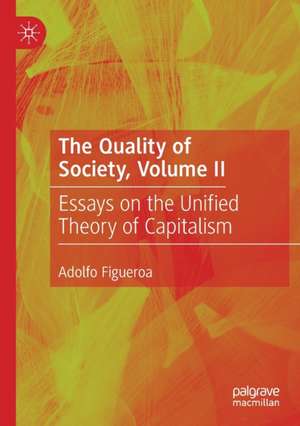The Quality of Society, Volume II: Essays on the Unified Theory of Capitalism
Autor Adolfo Figueroaen Limba Engleză Paperback – 17 sep 2022
| Toate formatele și edițiile | Preț | Express |
|---|---|---|
| Paperback (1) | 682.21 lei 6-8 săpt. | |
| Springer International Publishing – 17 sep 2022 | 682.21 lei 6-8 săpt. | |
| Hardback (1) | 686.40 lei 6-8 săpt. | |
| Springer International Publishing – 17 sep 2021 | 686.40 lei 6-8 săpt. |
Preț: 682.21 lei
Preț vechi: 802.60 lei
-15% Nou
Puncte Express: 1023
Preț estimativ în valută:
130.62€ • 136.02$ • 108.38£
130.62€ • 136.02$ • 108.38£
Carte tipărită la comandă
Livrare economică 14-28 februarie
Preluare comenzi: 021 569.72.76
Specificații
ISBN-13: 9783030795672
ISBN-10: 3030795675
Pagini: 230
Ilustrații: XIX, 230 p. 1 illus.
Dimensiuni: 148 x 210 mm
Greutate: 0.34 kg
Ediția:1st ed. 2021
Editura: Springer International Publishing
Colecția Palgrave Macmillan
Locul publicării:Cham, Switzerland
ISBN-10: 3030795675
Pagini: 230
Ilustrații: XIX, 230 p. 1 illus.
Dimensiuni: 148 x 210 mm
Greutate: 0.34 kg
Ediția:1st ed. 2021
Editura: Springer International Publishing
Colecția Palgrave Macmillan
Locul publicării:Cham, Switzerland
Cuprins
Preface.- Acknowledgements.- Contents.- Chapter 1_Introduction To Unified Theory Of Capitalism.- Chapter 2_Scientific Economic Laws Of Capitalism.- Chapter 3_European Colonialism And Capitalist Development.- Chapter 4_Hobsbawm’s Question On Peasantry.- Chapter 5_On Economic Behavior of Workers.- Chapter 6_Market Prices In The Anthropocene Age.- Chapter 7_Inequality, Power Relations, And Democracy.- Chapter 8_Toughest Challenge Of Economics: Human Society Isn’t Immortal.- Conclusions.- References.- Author Index_Countries Index_Subject Index.
Notă biografică
Adolfo Figueroa holds a Ph.D. degree in economics from Vanderbilt University, USA. He is a Professor Emeritus of Economics at the Catholic University of Peru. He has published several books with Palgrave: The Quality of Society, Economics of the Anthropocene Age, Rules for Scientific Research in Economics, and Growth, Employment, Inequality, and the Environment. During his distinguished academic career, Figueroa served as a visiting professor at American, European, and Latin American universities. And he participated in several international collaborative research projects (at the University of Oxford, University of Wisconsin-Madison, and other institutions). As a professional economist, he worked as consultant to several international organizations (including the World Bank, ILO, UNDP, FAO, and IFAD), doing fieldwork in Africa, Asia, and Latin America.
Textul de pe ultima copertă
This book articulates a unified theory of capitalism as an attempt to provide a comprehensive scientific theory of this social system. A unified theory of capitalism is not the combination of the predominant economic theories—neoclassical, classical, and Keynesian—so as to make them compatible. It is not a composite economic theory. It is a new economic theory. Predictions of the theory’s models were consistent with eight basic empirical regularities of capitalism dealing with economic growth, income inequality, employment level, and environment degradation. Therefore, the unified theory can be accepted as a good approximation of the real capitalist world. But the models were constructed at a high level of abstraction. Also problematic was the need to work out more fully the public policy implications of the theory. It is, therefore, no wonder that essays on the unified theory to answer these questions are a natural outcome of a new scientific endeavor attempting to reach a unity of knowledge in economics.
Adolfo Figueroa holds a Ph.D. degree in economics from Vanderbilt University, USA. He is a Professor Emeritus of Economics at the Catholic University of Peru. He has published several books with Palgrave: The Quality of Society, Economics of the Anthropocene Age, Rules for Scientific Research in Economics, and Growth, Employment, Inequality, and the Environment. During his distinguished academic career, Figueroa served as a visiting professor at American, European, and Latin American universities. And he participated in several international collaborative research projects (at the University of Oxford, University of Wisconsin-Madison, and other institutions). As a professional economist, he worked as consultant to several international organizations (including the World Bank, ILO, UNDP, FAO, and IFAD), doing fieldwork in Africa, Asia, and Latin America.
Adolfo Figueroa holds a Ph.D. degree in economics from Vanderbilt University, USA. He is a Professor Emeritus of Economics at the Catholic University of Peru. He has published several books with Palgrave: The Quality of Society, Economics of the Anthropocene Age, Rules for Scientific Research in Economics, and Growth, Employment, Inequality, and the Environment. During his distinguished academic career, Figueroa served as a visiting professor at American, European, and Latin American universities. And he participated in several international collaborative research projects (at the University of Oxford, University of Wisconsin-Madison, and other institutions). As a professional economist, he worked as consultant to several international organizations (including the World Bank, ILO, UNDP, FAO, and IFAD), doing fieldwork in Africa, Asia, and Latin America.
Caracteristici
Presents a more historical companion volume to the author's larger project Explains the persistence of inequality both within countries and between them Highlights how capitalism depletes natural resources and pollutes the natural environment
